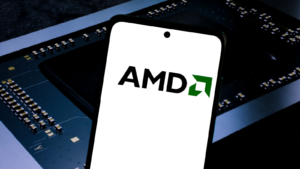3 Semiconductor Stocks to Bet On for Financially Secure future
In the semiconductor industry, the foundation of progress lies within the complex architecture of semiconductors. With the advent of AI, the gears of innovation turn ever faster. The article lists three companies at the forefront of this symphony of technology. This has led to the rise of semiconductor stocks to buy.
The first one was once an unassailable giant. It is engineering a bold resurgence through its mastery of artificial intelligence and strategic foundry services. Intertwined with a rapidly expanding AI universe, its ambitions could elevate it to new heights in the $1 trillion semiconductor arena.
Meanwhile, the second one dances to its tune. It orchestrates a multifaceted symphony that resonates in data centers, gaming realms, and AI landscapes. With architectural prowess, it has woven a tale of server dominance, client innovation, and cutting-edge AI solutions, all harmonizing to propel its ascendancy.
With that said, here are the best semiconductor stocks to buy.
Intel (INTC)

Intel’s (NASDAQ:INTC) focus on executing its processes and product roadmaps bolster customer confidence. Its AI strategy is a standout, with plans to democratize AI across various workloads and usage models. This includes a full silicon and software IP suite to drive AI from the cloud to the enterprise, network, edge, and client. The goal is to provide customers with the best possible total cost of ownership (TCO).
Intel’s embrace of AI as one of its core “superpowers” positions it to tap into a $1 trillion semiconductor industry by 2030. Intel Foundry Services aligns with this strategy and aims to capitalize on the AI market and ensure a secure global supply chain. IFS expansion accelerates the IDM 2.0 strategy, strengthening Intel’s foundry offerings.
Furthermore, the company’s semiconductor manufacturing advancements are noteworthy. Progress on nodes like Intel 7 and Intel 4 (EUV-based) demonstrates its commitment to technical excellence. Additionally, Intel’s upcoming Meteor Lake platform, built on Intel 4 with 3D packaging technology, marks a key inflection point, featuring an integrated AI engine for various applications.
Intel’s Meteor Lake may drive an AI PC inflection point in the client business, capitalizing on evolving hybrid work demands. The focus on AI extends to the data center, where Intel’s 4th Gen Xeon Scalable processor has demonstrated strong customer demand for AI workloads. Further, Intel’s accelerator products, including Gaudi, are gaining traction in the AI market and show promising growth prospects. This makes it one of those important semiconductor stocks.
The collaboration with Boston Consulting Group highlights Intel’s drive to deliver secure and responsible generative AI solutions. Across multiple segments, including PSG, NEX, and Mobileye, Intel is positioning itself for growth, even amidst market corrections. Finally, the emphasis on innovation is evident with breakthroughs in quantum computing and the drive to optimize cost structures.
Advanced Micro Devices (AMD)

In the data center business, Advanced Micro Devices, or AMD (NASDAQ:AMD) 4th Gen EPYC CPUs have gained traction, with cloud providers like Amazon AWS (NASDAQ:AMZN), Alibaba (NYSE:BABA), Microsoft (NASDAQ:MSFT), and Oracle (NYSE:ORCL) launching new instances based on these processors.
AMD’s Genoa architecture offers significantly improved performance and efficiency. Interestingly, it is contributing to its dominance in the server processor market. The Zen 4 server product portfolio expansion, including Bergamo and Genoa-X, further bolsters AMD’s presence in the data center ecosystem.
Fundamentally, the company’s AI strategy focuses on delivering a comprehensive portfolio of leading GPUs, CPUs, and adaptive computing solutions for AI inference. The introduction of Instinct MI300X GPUs, designed for generative AI, underscores AMD’s focus on providing cutting-edge AI solutions.
Additionally, the Ryzen 7000 series CPUs drive growth in the client segment, with the industry’s first x86 processors featuring a dedicated AI engine. AI integration in PC experiences and increased adoption of Ryzen CPUs may drive client segment growth. The gaming segment remains strong, benefiting from semi-custom SoC sales and continuous GPU innovations like the RDNA 3 architecture.
Also, AMD’s embedded segment is thriving, supported by adaptive computing solutions like the Versal Premium VP1902 adaptive SoC. While facing fluctuations due to market conditions, the segment may maintain momentum through AMD’s comprehensive product portfolio. All in all, it’s one of those semiconductor stocks to buy.
Looking ahead, AMD anticipates strong growth in the data center market. It will be driven by the increasing adoption of 4th-generation EPYC CPUs and the launch of Instinct MI300 accelerators. Finally, the company’s commitment to AI R&D and ecosystem partnerships positions it to capture a significant share of the AI accelerator market, projected to exceed $150 billion by 2027.
Taiwan Semiconductor (TSM)

Taiwan Semiconductor, or TSMC (NYSE:TSM), focuses on advanced semiconductor technology, such as its 3-nanometer (N3) technology, which is already in production with a good yield. Remarkably, N3 showcases robust demand for high-performance computing (HPC) and smartphone applications.
Additionally, the forthcoming N3E variant, with enhanced performance and yield, is set to strengthen TSMC’s product portfolio further. The company’s continued investment in leading-edge specialty and advanced packaging technologies aligns with the growing demand for energy-efficient computing in AI, HPC, and data centers.
Furthermore, TSMC is poised to capitalize on the increasing demand for computation driven by 5G and HPC megatrends. The growth potential in AI-related demand, with applications requiring high computing power, aligns with TSMC’s strengths in the technology and design ecosystem. TSMC’s HPC platform is projected to contribute to its long-term growth, with a 15-20% forecasted revenue growth.
Strategically, TSMC has expanded its global manufacturing footprint. It includes fabs in the US, Japan, Europe, and China and underlines its intention to become a trusted technology and capacity provider for the global logic IC industry. This geographic flexibility contributes to TSM’s value proposition. Also, the company’s focus on managing costs and leveraging economies of scale supports its long-term gross margin target of 53% and higher. It’s definitely one of those semiconductor stocks to pay attention to.
Financially, TSMC’s strategic capital allocation involves prudent management of capital spending. The 2023 capital budget is expected to range between $32 billion and $36 billion, reflecting a cautious approach due to near-term uncertainties.
As of this writing, Yiannis Zourmpanos was long TSM and INTC. The opinions expressed in this article are those of the writer, subject to the InvestorPlace.com Publishing Guidelines.

